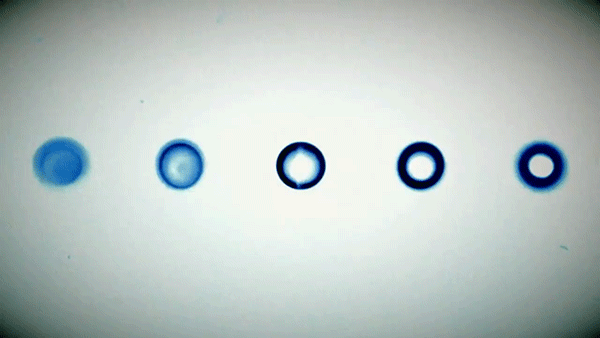15 June 2016
Scanning electron microscopy (SEM) is a powerful imaging technique that produces images of a sample by scanning it with a beam of electrons instead of light. The electrons interact with the atoms in the sample to produce signals containing information about the sample’s surface topology and composition. Because electrons are much smaller than the wavelength of visible light, SEM can achieve resolutions better than 1 nanometer (100,000x thinner than human hair).
Here, an SEM is used to zoom in on a prepared sample by several orders of magnitude. The microscope initially reveals an amphipod, a type of shell-less crustacean (1mm). As it zooms in on the head of the amphipod, a round, silica-shelled algae called a diatom is revealed (100µm). As it zooms in even further, a rod-shaped bacterium can be seen resting on the diatom (500nm).
Source: http://goo.gl/gxGDPb
#ScienceGIF #Science #GIF #Microscope #Zoom #Electron #Scanning #SEM #Bacterium #Diatom #Amphipod #Magnitude #Scale #Life #Size
View Original Post on Google+
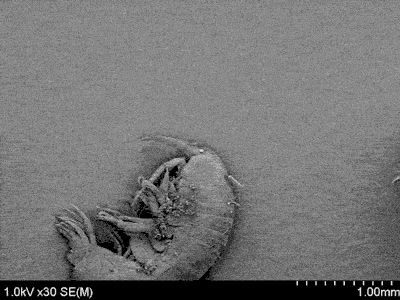
14 June 2016
This collision between two cherries depicts a fundamental property of classical mechanics: the conservation of momentum. Momentum is defined as the product of the mass and the velocity of an object. The conservation of momentum is implied by Newton ‘s third law of motion, which states that for every action (force) there is an equal and opposite reaction. As the two cherries collide, the net momentum of the system is maintained as the cherries bounce backwards and the water droplets continue forwards.
Source: https://vimeo.com/139653312
#ScienceGIF #Science #GIF #Physics #Cherry #Collision #Momentum #Inertia #Classical #Mechanics #Newton #Motion #Law #State #Frame #Reference
View Original Post on Google+
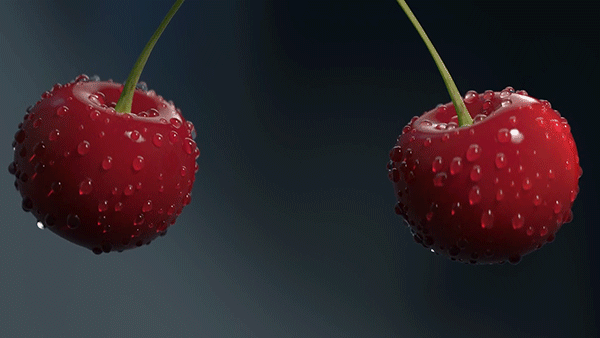
13 June 2016
The lifted condensation level is the height at which the relative humidity of air reaches 100% and allows for the formation of cloud droplets via condensation. This occurs because the relative humidity of air increases when cooled since the amount of water vapor remains constant but the saturation vapor pressure decreases exponentially with temperature.
Orographic clouds are a special example of the lifted condensation level that occurs as humid air blows over a mountain. Because the air must rise to go over the mountain, it often begins to condensate and forms clouds. However, since the air quickly sinks on the leeward side of the mountain, the clouds are short-lived and rapidly evaporate back into water vapor.
Source: https://youtu.be/gvAK63KOJM8
#ScienceGIF #Science #GIF #MountFuji #MtFuji #Fuji #Japan #Mountain #Volcano #Sunset #Sun #Clouds #Orographic #Light
View Original Post on Google+

9 June 2016
Each one of these microscopic cylindrical tubes is roughly 10 microns in length and chemically propelled like a space-faring rocket. They draw in fuel from the surrounding environment, which reacts with the catalysts coating the interior to produce gases (oxygen). These resulting gases bubble out the rear of the microrocket, creating thrust capable of propelling the tubes at more than 1000 body-lengths/second.
Researchers have already demonstrated the ability to haul cargo with these tiny rockets and hope to one day use them to precisely deliver drugs and isolate cancer cells.
Source: https://youtu.be/6b4o0wHDzpA
#ScienceGIF #Science #GIF #Nanoscience #Microscopic #Nanometer #Micrometer #Rocket #Chemical #Reaction #Propulsion #Load #Bubbles #Nanotechnology #Fabrication
View Original Post on Google+
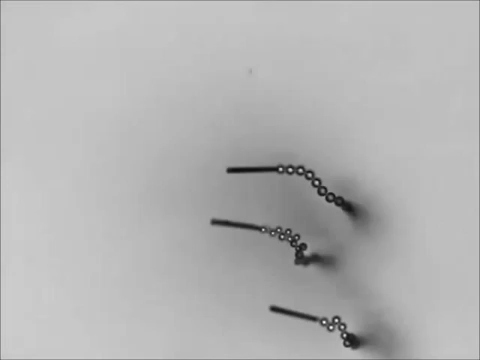
8 June 2016
Dry ice is the solid form of carbon dioxide (CO2) that is primarily used as a cooling agent. It offers a lower temperature than water (H2O) ice and does not leave any residue, making it ideal for preserving frozen foods where mechanical cooling is unavailable.
Dry ice sublimes at -78.5°C (-109.3°F) at Earth atmospheric pressure (1atm). Sublimation is the transition of a substance directly from the solid to the gas phase without passing through the intermediate liquid phase. It is an endothermic process (energy absorbing) that occurs at temperatures and pressures below a substance ‘s triple point (-56.4°C and 5.13atm).
Source: https://youtu.be/TisYXP-7D2w
#ScienceGIF #Science #GIF #DryIce #CarbonDioxide #Solid #Gas #Sublimate #Sublimation #Phase #Transition #Chemistry #Temperature #Pressure #Vapor
View Original Post on Google+
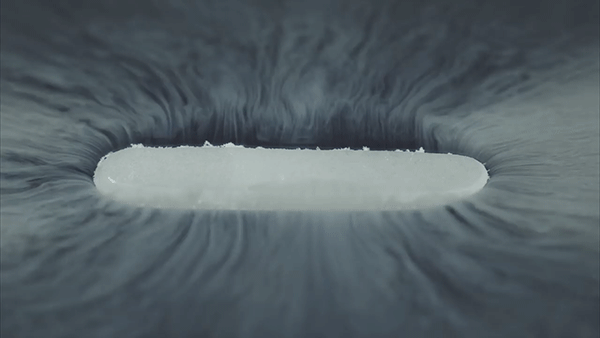
3 June 2016
In fluid dynamics, a von Kármán vortex sheet is a repeating pattern of swirling vortices caused by an unsteady separation of flow around blunt bodies. The flow of atmospheric air over obstacles such as isolated mountains can cause these vortices to form. Clouds present at the appropriate altitude allow for satellite visualization of the sheets.
Tall buildings must be constructed with downstream longitudinal fins to prevent the eddies from interacting to form vortices. This phenomenom is also responsible for the “singing” of telephone/power lines.
Source: http://www.bbc.co.uk/programmes/p00gbfn2 (BBC)
#ScienceGIF #Science #GIF #Fluid #Dynamics #Meteorology #Clouds #Vortex #vonKarman #Sheet #Mountains #Atmosphere #Flow
View Original Post on Google+
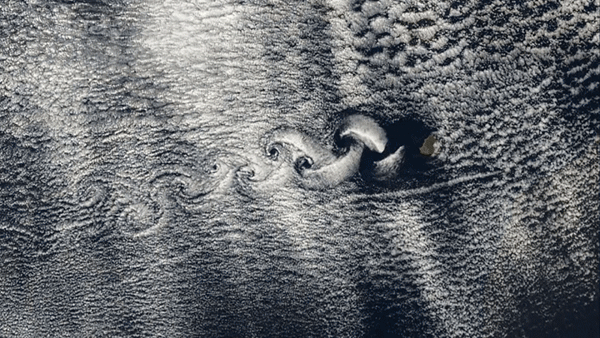
2 June 2016
Ecballium elaterium , also known as the Squirting Cucumber, is a flowering plant native to Europe and northern Africa. Its name stems from its unique method of violently releasing seeds when ripe via a stream of liquid. The internal pressure causes the fruit to disconnect from the main plant and launches the seeds outwards. The plant and its fruit are both poisonous and was considered to be an abortifacient in the ancient world.
Source: https://youtu.be/NsIojj4PzAo
#ScienceGIF #Science #GIF #Cucumber #Plant #Biology #RapidPlantMovement #Flower #Seed #Ripe #Smithsonian
View Original Post on Google+
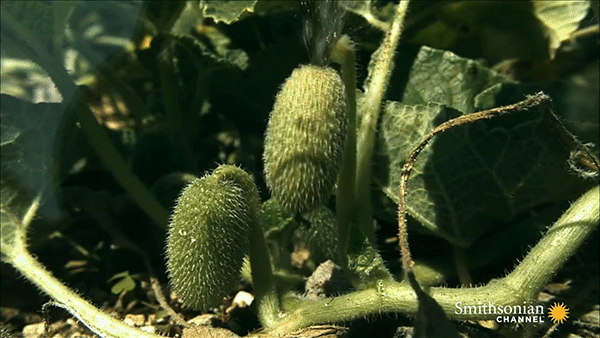
1 June 2016
Polypyrrole is a conducting polymer than can be manipulated using certain wavelengths of light. A water droplet coated in polypyrrole (the black dot) will bend depending on the angle of illumination. This bending can be used to steer the motion of the coated droplet.
Here, the polypyrrole water droplet is being used to haul a load that weighs 150 times its weight across water. As the infrared laser illuminates the droplet, it causes motion in the opposite direction. However, because of the weight of the load, the droplet bursts from the force being applied by the laser.
This technology has potential in medicine for the targeted delivery of drugs or insertion of tiny medical devices.
Source: https://youtu.be/vpl9sY1jY98
#ScienceGIF #Science #GIF #Polypyrrole #Polymer #Conducting #Laser #Motion #Water #Load #Engine #Pull #Push #IR #Infrared
View Original Post on Google+
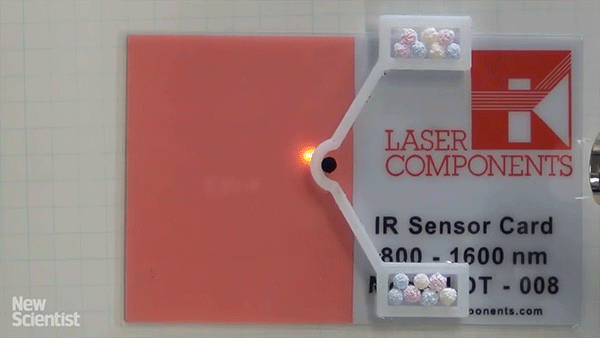
28 May 2016
SpaceX successfully landed its third Falcon 9 first-stage rocket yesterday afternoon on the autonomous droneship Of Course I Still Love You. This footage of the descent and landing was captured from an onboard camera and begins shortly after stage separation. The payload for the THAICOM 8 mission was a 3,100kg communications satellite for a Thai telecom company.
Source: https://youtu.be/4jEz03Z8azc (SpaceX)
#ScienceGIF #Science #GIF #SpaceX #Falcon9 #Rocket #Stage #Landing #Camera #Video #Sea #Ocean #Space #Aeronautical #Aerospace #Flame
View Original Post on Google+
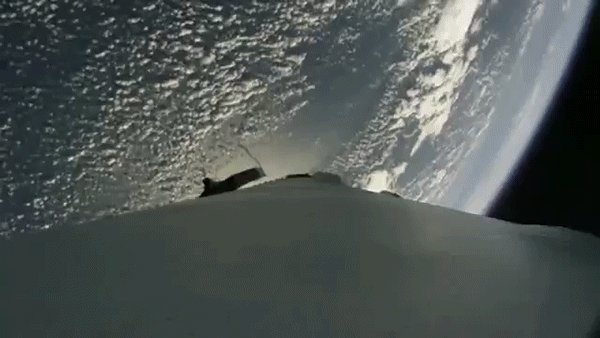
26 May 2016
The SLAC National Accelerator Laboratory’s Linac Coherent Light Source (LCLS) is the world ‘s most powerful X-ray laser. The two-mile-long linear accelerator is used to produce ultrafast pulses of light (30 femtoseconds) in order to take stop-motion pictures of atoms and molecules in motion. The laser’s wavelength (0.151 nanometers) is comparable to that of an atom, which provides extremely high resolution imaging capabilities.
Here, a pulse of the X-ray laser can be seen vaporizing 40µm droplets of water. Because of the speed of the interaction, imagery is captured in stop-motion over many repeated experiments and combined to produce a video. A secondary, time-delayed pulsed laser is used to illuminated the scene following the primary X-ray laser interaction.
Source: https://youtu.be/v5bH01qNN0Y
Publication: https://dx.doi.org/10.1038/nphys3779
#ScienceGIF #Science #GIF #Laser #XRay #Droplet #Water #Vaporize #Liquid #Energy #Femtosecond #Nanometer #Video #StopMotion #Atom #Molecule
View Original Post on Google+
